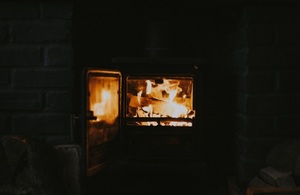Restrictions on sale of coal and wet wood for home burning begin
Sales of coal and wet wood for household burning are being phased out to cut harmful pollution to human health

Restrictions on the sale of coal, wet wood and manufactured solid fuels for burning in the home have come into force from today (1 May).
Burning at home, particularly with traditional house coal or wet wood, is a major source of the pollutant PM2.5 – tiny particles which can enter the bloodstream and lodge in lungs and other organs. PM2.5 has been identified by the World Health Organisation as the most serious air pollutant for human health.
People with log burners and open fires can still use them, but will be required to buy cleaner alternative fuels – if they are not already – such as dry wood and manufactured solid fuels which produce less smoke. Both of these cleaner options are just as easy to source and more efficient to burn, making them more cost effective. Burning dry wood also produces more heat and less soot than wet wood and can reduce emissions by up to 50%.
The restrictions that start from today mean that:
- Sales of bagged traditional house coal and wet wood in units under 2m3 are now unlawful.
- Wet wood in larger volumes must be sold with advice on how to dry it before burning.
- All manufactured solid fuels must now have a low sulphur content and only emit a small amount of smoke.
- In addition, a new certification scheme will see products certified and labelled by suppliers to ensure that they can be easily identified, and retail outlets will only able to sell fuel that is accompanied by the correct label.
The government’s Clean Air Strategy committed to legislation prohibiting the sale of the most polluting fuels, with today’s announcement putting that ambition into action.
Environment Minister Rebecca Pow said:
“Burning cleaner fuels is a more efficient option for households across England, helping reduce our exposure to this incredibly harmful pollutant and benefitting the environment. Cleaner fuels are also better for consumers as they create less smoke and soot and more heat.
“This legislation marks the latest step in delivering on the challenges we set ourselves in our Clean Air Strategy, making sure that both we and future generations can breathe cleaner air.
“We know air pollution at a national level has reduced significantly since 2010 – with emissions of fine particulate matter down 11% and nitrogen oxide 32% - but there is still a huge amount to do to tackle pollution from all sources, including transport, agriculture, industry and domestic burning.”
The legislation forms part of a wider package of actions to tackle air pollution, including measures in the Environment Bill to set an ambitious, legally-binding target to reduce particulate matter.
Harriet Edwards, Senior Policy and Projects Manager for Air Quality at Asthma UK and the British Lung Foundation, said:
“Air pollution is harmful to everyone but for the millions of people in the UK with a lung condition such as asthma or chronic obstructive pulmonary disease (COPD), it can put them at risk of suffering potentially life-threatening asthma attacks or flare-ups.
“Alongside road traffic, wood and coal burning is a major source of fine particulate matter (PM2.5) pollution, the most worrying form of pollution to human health. It’s vital that we tackle all of these sources of air pollution and raise awareness about the dangers of air pollutants so people can make the best choices for their own health as well as the health of others around them.”